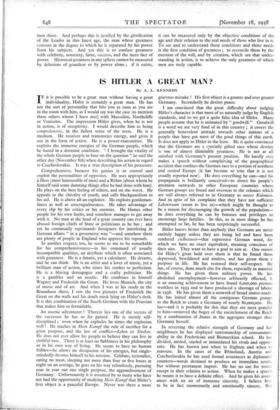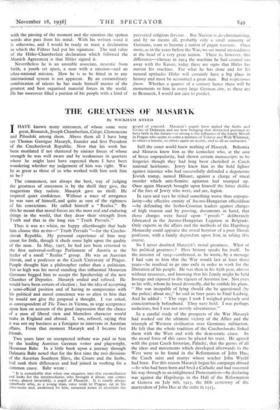IS HITLER A GREAT MAN ?
By A. L. KENNEDY
IF it is possible to be a great man without having a great individuality, Hitler is certainly a great man. He has not the sort of personality that hits you as soon as you are in the room with him, as I would say was the case (to mention three others whom I have met) with Mussolini, Northcliffe or Venizelos. The impression Hitler gives,. when he is not in action, is of receptivity. I would describe him as being comprehensive, in the fullest sense of the term. He is a medium. He receives and transmutes energy, and gives it out in the form of action. He is a power-transmitter. He exploits the immense. energies of the German people, which he found in a dormant condition. " I brought the vitality of the whole German people to bear on the question " he said the other day (November 8th) when describing his action in regard to Czechoslovakia. It was a true description of his processes.
Comprehensive, because his genius is to control and exploit the personalities of opposites. He uses appropriately a Hess (most honourable of men) and a Rdhm (about whom he himself said some damning things after he had done with him). He plays on the best feeling of others, and on the worst. He appeals to the chivalry of youth, and calls blackguardism to his aid. He is above all an exploiter. He exploits gentleman- liness as well as unscrupulousness. He takes advantage of every slip by his critics or his enemies. He blames other 'people for his own faults, and somehow manages to get away with it. No man at the head of a great country can ever have abused foreign chiefs of State or politicians as he has ; and yet he continually reprimands foreigners for interfering in German affairs " in a governessy way "—and somehow there are plenty of people in England who approve his reproofs.
In another respect, too, he seems to me to be remarkable for his comprehensiveness—in his command of usually incompatible qualities, an attribute which is often associated with greatness. He is a fanatic, yet a calculator. He dreams, and he can think. He is an artist and a lover of music, yet a brilliant man of action, who times his strokes to perfection. He is a blaring demagogue and .a crafty politician. He is a gambler and an ascetic. He combines in himself Wagner and Frederick the Great. He loves Munich, the city of music and of art. And when I was in his study in the Braunhaus there, I saw the two pictures of Frederick the Great on the walls and his death mask lying on Hitler's desk. It is this combination of the South German with the Prussian that makes him so formidable.
An ascetic adventurer ! Therein lies one of the secrets of the successes he has so far gained. He is sternly self- disciplined ; even when he explodes he times the explosion well ! He teaches in Mein Kampf the rule of sacrifice for a great purpose, and the law of conffict—Leben ist Streben. He does not ever allow his people to believe they can live in slothful ease. There is at least no flabbiness in his philosophy or in his own way of living. He seems to have no human foibles—he allows no dissipation of his energies, but single- mindedly devotes himself to his mission. Celibate, teetotaller, eating no meat, sleeping not more than four or five hours at night on an average, he goes on his way relentlessly, pursuing year in year out one single purpose, the aggrandisement of Germany: Unfortunately it is assumed by so many who have not had the opportunity of studying Mein Kampf that Hitler's first object is a peaceful Europe. Never was there a more grievous mistake ! His first object is a greater and ever greater Germany. Secondarily he desires peace.
I am convinced that the great difficulty about judging Hitler's character is that most of us naturally judge by English standards, and so we get a quite false idea of Hitler. Many people assume that he is animated by " goodwill." Goodwill is a word we are very fond of in this country ; it covers the generally benevolent attitude towards other nations of a people that have got most of the good things of this earth. It does not apply to Hitler in the least. He is quite convinced that the Germans are a specially gifted race whose destiny is one of almost illimitable greatness. He is • not at all satisfied with Germany's present position. He hardly ever makes a speech without complaining of the geographical accident that confines the German race to a portion of northern and central Europe (it has become so trite that it is not usually reported now). He does everything he can—and his propaganda is brilliantly conceived—to direct his people's attention outwards to other European countries where German groups are found and overseas to the colonies _which are still always referred to in Germany as unsere Kolonien. And in spite of his complaint that they have not sufficient Lebensraum (room to live in)—which might be thought to be a reason for discouraging the growth of the population— he does everything he can by bonuses and privileges to encourage large families. In this, as in most things be has attempted so far, he has been surprisingly successful.
Hitler knows better than anybody that Germans are never entirely happy unless they are being led and have been rendered zielbewusst—that expressive German word, for which we have no. exact equivalent, meaning conscious of their aim. They want to have a goal to aim at. One reason for Hitler's great hold over them is that he found them depressed, bewildered and aimless, and has given them a purpose in life. He has restored their self-respect. He has, of course, done much else for them, especially in material things. He has given them military power. He has abolished unemployment—however arbitrarily effected, it is an amazing achievement to have found 6,000,000 persons workless in 1933 and to have produced a shortage of labour in 1938. He has given them a network of broad motor-roads. He has joined almost all the contiguous German groups to the Reich to create a Germany of nearly 8o,000,000. He has—and it is probably for this that they are most grateful to him—removed the bogey of the encirclement of the Reich by a combination of States in the aggregate stronger than Germany herself.
In reversing the relative strength of Germany and her neighbours he has displayed statesmanship of consummate ability in the Frederician and Bismarckian school. He has divided, misled, cajoled or intimidated his rivals and oppon- ents. He has known just when to frighten and when to reassure. In the cases of the Rhineland, Austria and Czechoslovakia he has used formal assurances as diplomatic counters—words destined to produce an immediate result, but without permanent import. He has no use for words except in their relation to action. When he makes a speech he means it to have a definite effect. And he gives his assur- ances with an air of immense sincerity. I believe him to be in fact momentarily and emotionally sincere. But with the passing of the moment and the emotion the spoken words also pass from his mind. With his written word it is otherwise, and I would be ready to trust a declaration to which the Fiihrer had put his signature. The real value of the Hitler-Chamberlain declaration which followed the Munich Agreement is that Hitler signed it.
Nevertheless he is an unstable associate, neurotic from birth, a youth set apart, a man with a mission—and an ultra-national mission. How he is to be fitted in to any international system is not apparent. By an extraordinary combination of talents he has made himself master of the greatest and best organised material forces in the world. He has moreover filled a portion of his people with a kind of perverted religious fervour. But Nazism is de-christianising, and by no means all, probably only a small minority of Germans, want to become a nation of pagan warriors. Once more, as in the years before the War, we see moral unsteadiness at the head of a very great nation. There is, however, this difference—whereas in 1914 the machine he had created ran away with the Kaiser, today there are signs that Hitler has outrun his machine. For what he has done and for his natural aptitudes Hitler will certainly have a big place in history and must be accounted a great man. But respiciamus finem. Whether a quarter of a century hence there will be monuments to him in every large German city, as there are to Bismarck, I would not care to predict.

























































 Previous page
Previous page